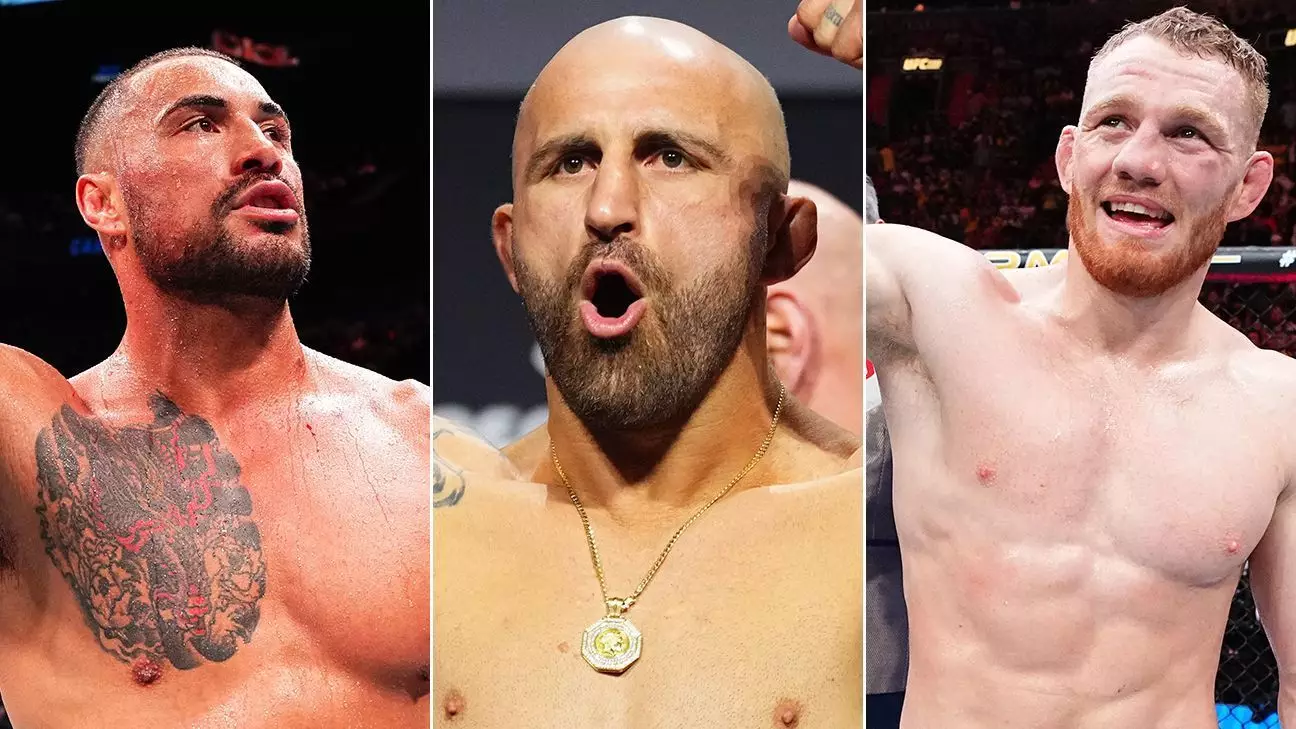The landscape of mixed martial arts in Australia and New Zealand is in a dramatic shift, one that could redefine its place within the global UFC hierarchy. Encapsulated within a tight frame of 49 days, the performances of three burgeoning stars—Carlos Ulberg, Alexander Volkanovski, and Jack Della Maddalena—may not only redefine their careers but also the perception of the talent emerging from this region. Their upcoming battles are not mere bouts but strategic showcases that emphasize the growth and potential of fighters in Oceania, marking a pivotal entry into a realm traditionally dominated by seasoned competitors.
Carlos Ulberg will step into the Octagon this Saturday, determined to elevate his standing against former light heavyweight champion Jan Blachowicz. With an impressive record of seven consecutive victories, four of which ended in knockout or technical knockout, Ulberg stands on the precipice of greatness. A win could instantaneously catapult him into title contention, setting a benchmark for future fighters from Oceania. In interviews, Ulberg exemplified a mindset molded by resilience and focus, underscoring the careful preparation involved: “You’ve wished to be a world champion, and it comes with the job.” The implication is profound; success isn’t just about raw talent but the thorough dedication that develops a contender.
Facing the Challenge: Volkanovski’s Redemption Arc
Paradoxically, while Ulberg rises, Alexander Volkanovski faces a different narrative thread. The former featherweight champion is reeling from a series of setbacks. With only one victory in his last four outings—two of which were in the highly competitive lightweight division—the pressure mounts as he faces Diego Lopes in a critical title fight. More than just an opportunity for redemption, this fight serves as a testimony to Volkanovski’s enduring spirit and evolution as a fighter.
Volkanovski has repeatedly acknowledged that age and a prolonged absence from competition pose legitimate threats. However, he remains resolute, emphasizing a well-analyzed game plan and adequate training efforts. “I know I still got it,” he assures, projecting an air of confidence that may help counterbalance doubts swirling around him. Thus, his match is not merely about reclaiming a title but solidifying his legacy in a transforming division while inspiring the next generation of fighters from his homeland. Volkanovski’s perspective on facilitating future talent, especially by leading the charge against the odds, resonates with fans and emerging athletes alike.
The Rising Stars: Della Maddalena’s Ascendancy
Jack Della Maddalena, meanwhile, finds himself in an unexpected spotlight, thrust into a welterweight title fight against Belal Muhammad at UFC 315. This opportunity came sooner than anticipated, indicative of Della Maddalena’s exceptional skill and the UFC’s burgeoning interest in talent from the region. His eagerness to ascend to championship status reflects not only personal ambition but also a commitment to elevating Australian MMA on the international stage.
Della Maddalena’s aspirations echo the sentiments of his contemporaries. “I want to bring the belt back home and then bring a lot of events [to Australia],” he articulated, demonstrating a deeper understanding of the connection between personal success and regional growth. His mindset illustrates the collective ethos among these fighters seeking not just personal accolades but broader recognition and resources for their homeland.
Strong Foundations: The Need for Infrastructure
A vital part of this discussion revolves around the urgent need for improved support systems and facilities within Australia and New Zealand, akin to those enjoyed by champions in sports like rugby and football. The call for establishing a Performance Institute in the region is a crucial step toward enabling fighters to reach their full potential.
Ulberg emphasized this point in a recent interview, articulating the notion that enhanced training facilities would cultivate a new wave of talent that could challenge for titles and boost the prestige of MMA down under. With the advanced resources, training regimens could reach unprecedented levels, providing athletes with everything they need to succeed—from rehabilitation options like ice baths to physiotherapy—a fundamental shift that could redefine performance standards.
As these fighters prepare to compete on international stages, they not only carry the weight of their personal aspirations but also serve as ambassadors for a burgeoning MMA community. The world is about to witness the mighty force of Australian and New Zealand fighters in a surge that may redefine the sport’s landscape, championing a new age of champions that extends well beyond the Octagon.


Napsat komentář